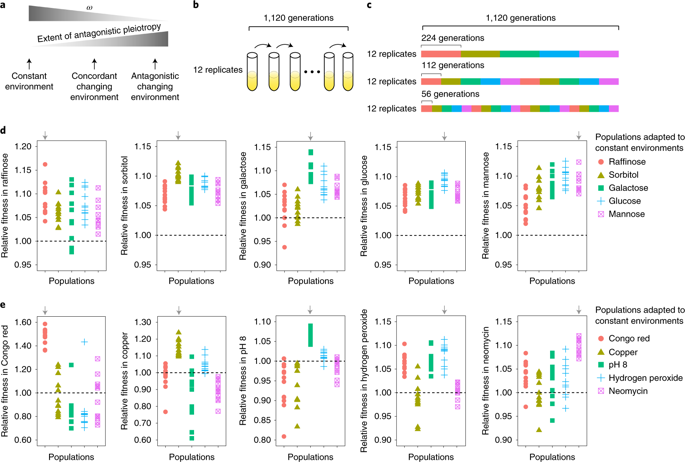Nature Ecology & Evolution ( IF 13.9 ) Pub Date : 2020-02-10 , DOI: 10.1038/s41559-020-1107-8 Piaopiao Chen 1 , Jianzhi Zhang 1

|
The importance of positive selection in molecular evolution is debated. Evolution experiments under invariant laboratory conditions typically show a higher rate of nonsynonymous nucleotide changes than the rate of synonymous changes, demonstrating prevalent molecular adaptations. Natural evolution inferred from genomic comparisons, however, almost always exhibits the opposite pattern even among closely related conspecifics, which is indicative of a paucity of positive selection. Here we hypothesize that this apparent contradiction is at least in part attributable to ubiquitous and frequent environmental changes in nature, causing nonsynonymous mutations that are beneficial at one time to become deleterious soon after because of antagonistic pleiotropy and hindering their fixations relative to synonymous mutations despite continued population adaptations. To test this hypothesis, we performed yeast evolution experiments in changing and corresponding constant environments, followed by genome sequencing of the evolving populations. We observed a lower nonsynonymous to synonymous rate ratio in antagonistic changing environments than in the corresponding constant environments, and the population dynamics of mutations supports our hypothesis. These findings and the accompanying population genetic simulations suggest that molecular adaptation is consistently underestimated in nature due to the antagonistic fitness effects of mutations in changing environments.
中文翻译:

拮抗性多效性掩盖了不断变化的环境中的分子适应性
正选择在分子进化中的重要性存在争议。在不变的实验室条件下的进化实验通常显示出比同义变化率更高的非同义核苷酸变化率,表明普遍的分子适应。然而,从基因组比较推断的自然进化几乎总是表现出相反的模式,即使在密切相关的同种中也是如此,这表明缺乏正选择。在这里,我们假设这种明显的矛盾至少部分归因于自然界无处不在且频繁的环境变化,由于拮抗性多效性并阻碍了它们相对于同义突变的固定,尽管人口持续适应,但导致一次有益的非同义突变很快变得有害。为了验证这一假设,我们在不断变化和相应的恒定环境中进行了酵母进化实验,然后对进化种群进行了基因组测序。我们观察到在对抗性变化环境中的非同义与同义比率比在相应的恒定环境中低,突变的种群动态支持我们的假设。这些发现和伴随的种群遗传模拟表明,由于突变在不断变化的环境中的拮抗适应性效应,分子适应在自然界中一直被低估。为了验证这一假设,我们在不断变化和相应的恒定环境中进行了酵母进化实验,然后对进化种群进行了基因组测序。我们观察到在对抗性变化环境中的非同义与同义比率比在相应的恒定环境中低,突变的种群动态支持我们的假设。这些发现和伴随的种群遗传模拟表明,由于突变在不断变化的环境中的拮抗适应性效应,分子适应在自然界中一直被低估。为了验证这一假设,我们在不断变化和相应的恒定环境中进行了酵母进化实验,然后对进化种群进行了基因组测序。我们观察到在对抗性变化环境中的非同义与同义比率比在相应的恒定环境中低,突变的种群动态支持我们的假设。这些发现和伴随的种群遗传模拟表明,由于突变在不断变化的环境中的拮抗适应性效应,分子适应在自然界中一直被低估。我们观察到在对抗性变化环境中的非同义与同义比率比在相应的恒定环境中低,突变的种群动态支持我们的假设。这些发现和伴随的种群遗传模拟表明,由于突变在不断变化的环境中的拮抗适应性效应,分子适应在自然界中一直被低估。我们观察到在对抗性变化环境中的非同义与同义比率比在相应的恒定环境中低,突变的种群动态支持我们的假设。这些发现和伴随的种群遗传模拟表明,由于突变在不断变化的环境中的拮抗适应性效应,分子适应在自然界中一直被低估。









































 京公网安备 11010802027423号
京公网安备 11010802027423号